Best meditation apps for mindfulness on iOS and Android in 2022
Because we all need a bit of calm right now
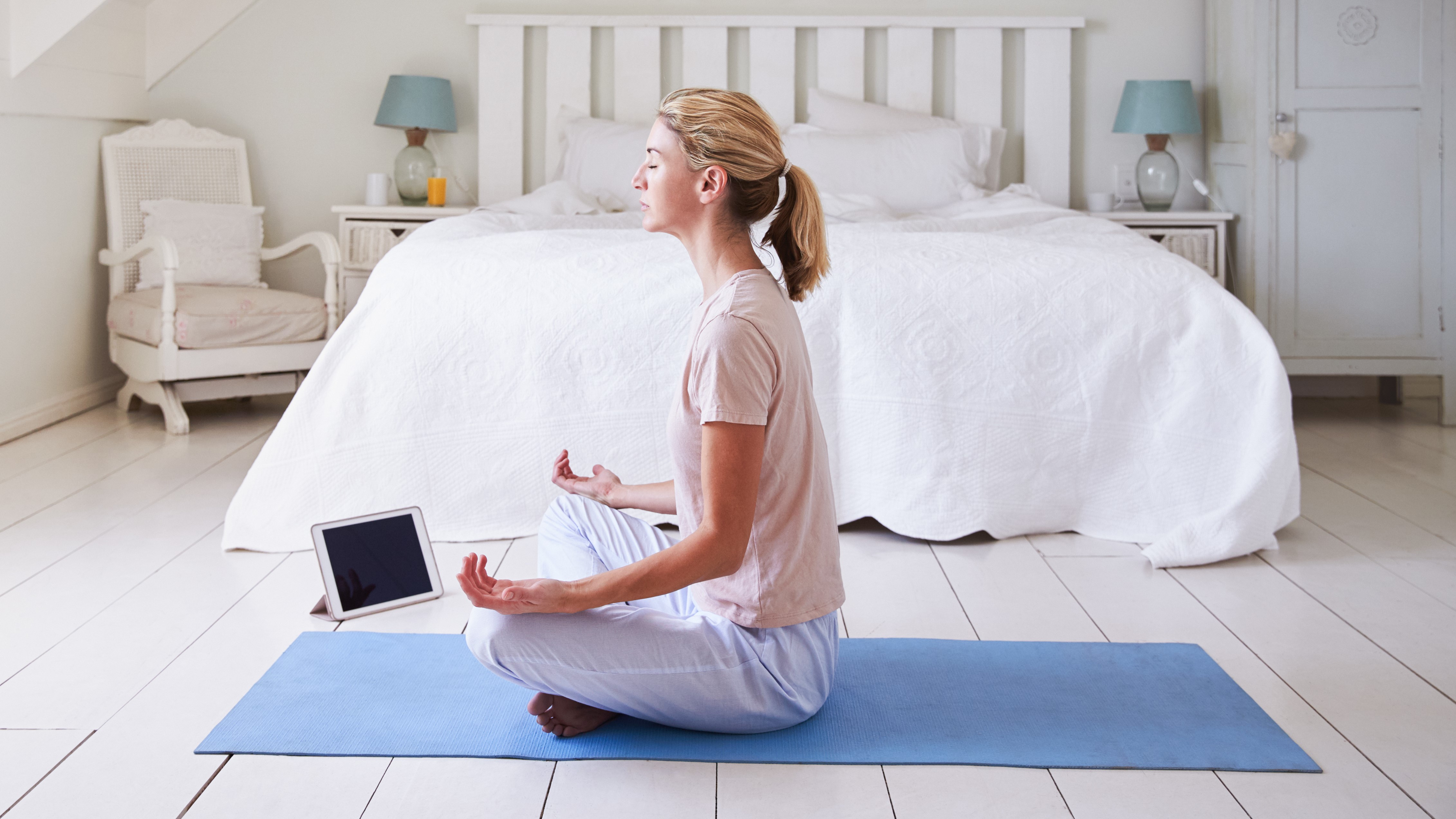
The best meditation apps could help you to sleep better, reduce your stress levels and find some much-needed inner peace. Meditation apps can give you a break from the news and a chance to chill out for ten minutes, regardless of whether you use an iPhone, an Android device, or an iPad.
Headspace, one of the most popular meditation apps around, launched over 10 years ago. Since then, hundreds of other meditation apps have been created and that means finding the best meditation app for you can be overwhelming.
But when it comes to meditation, choice is a good thing. There are now meditation apps to cater to all kinds of people and preferences. From apps for beginners that walk you through the basics of meditation (like Headspace and Buddhify), through to those that just provide you with a timer and sound cues so you can ‘freestyle’ your meditation practice instead (like Samsara Timer and Pocket Meditation Timer).
Not only are there different styles of apps, but different variations of meditative practice. You’ve likely heard celebs shout about the benefits of transcendental meditation, but most of the meditation apps you can download, and the ones on this list, allow you to practice a form of mindfulness meditation – less focus on chanting and mantras and more focus on, well, focus.
What is mindfulness meditation?
Why you can trust TechRadar
It’s easy to roll your eyes at the word ‘mindfulness’. We’ve all been inundated with books, articles and apps about becoming more mindful, from mindful swimming and shopping to mindfultidying and travelling, and everything else in-between. But, put simply, mindfulness is about being present and noticing what’s happening.
Contrary to popular belief, that doesn’t mean emptying your mind. Instead, it means paying more attention. Whether that’s to your thoughts, your breath or sounds around you. The benefit of mindfulness meditation is that you can start to take some of the presence and awareness you feel when you’re meditating into everything else you do throughout the day.
And, giving you the tools to be a bit more present throughout the day is just one of the many benefits of meditation. It’s still early days for scientific studies (so we can’t say for definite that meditation works well for everyone and brings about the same benefits for everyone), but results are promising.
So far, studies have shown meditation can lower blood pressure, improve sleep, alleviate some of the symptoms of depression, reduce stress and increase self-compassion, improve your memory and even bolster your immune system.
With all of that in mind, here’s our top pick of the best meditation apps at the moment. All of which we’ve used and tested (in some cases for years) to bring you the best chance of cultivating a bit more calm and a little less stress in your life.
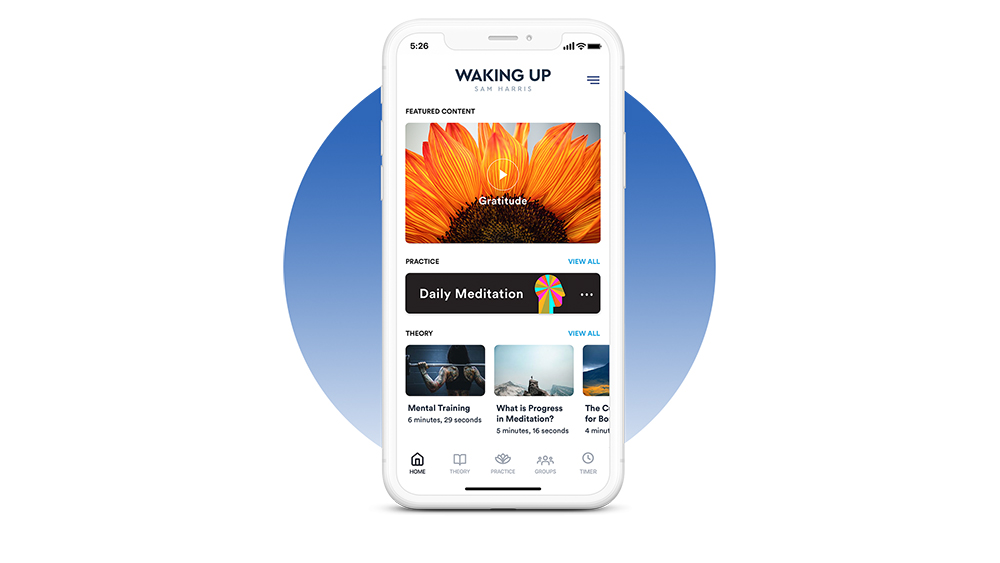
1. Waking Up
Waking Up was created by Sam Harris, a neuroscientist, philosopher, podcaster and author who teaches and discusses meditation in a modern, scientific context.
What we like about the Waking Up app above all others is it’s no-nonsense. There’s no chanting, twinkling rain sounds or spiritual references. Even the app itself has a very easy-to-use and minimal design.
The goal here is to be present and aware. But that doesn’t mean it isn’t also soothing and transformative. We’ve been using Waking Up for more than a year and have found it’s made a huge difference – particularly to stress levels and reactiveness.
There are two sections of Waking Up. The Practice section is where you can access simple daily meditations narrated by Sam Harris himself. When you first sign-up to the app, these daily practices will serve as an introduction to meditation, easing you into the basics of sitting still and becoming more aware.
But there’s also a section called Theory, which is about learning what’s going on behind the practice. Sam Harris interviews a number of prominent figures in the meditation, self-development and neuroscience spaces to discuss topics like death and awareness and also posts smaller lessons, which are like chunks of wisdom we sometimes listen to when we’ve already meditated that day.
This wealth of lessons, interviews and additional insights about meditation is what makes Waking Up stand apart from the competition. This is why we recommend Waking Up for those who want to get to grips with meditation, as well as the science and thinking behind it.
Pricing: Free. But with in-app purchases to unlock more content. You can also get in touch with Sam Harris and the creators if you really want to try more of the app but can’t afford it.
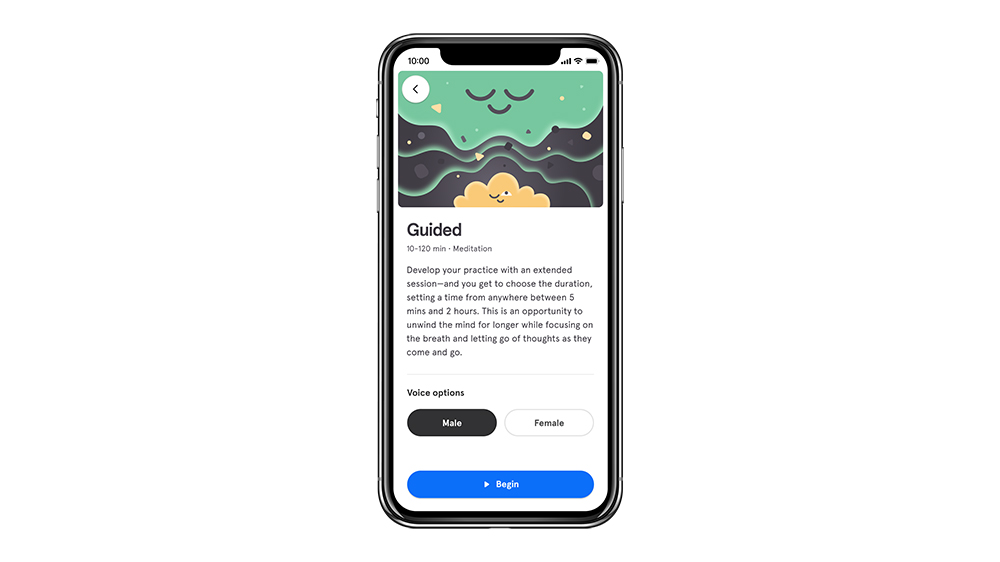
2. Headspace
Headspace is one of the most popular meditations apps – and for good reason. We first started meditating with Headspace more than six years ago and credit it with getting our heads around the obstacles that can come up when you first choose to meditate. How do we sit still? What if we get caught up in thinking? How do we stop beating ourselves up when we get distracted?
It managed to ease us into a daily practice through an easy-to-use app full of color, simple instructions, fantastic visuals to illustrate what’s going on when you meditate and the soothing voice of Headspace’s founder, Andy Puddicombe.
This is a great first port of call for beginners looking to get to grips with meditating. One of the best bits is there are so many different types of meditation to try for all kinds of situations. Whether it’s a simple mindfulness practice, meditation for kids, for sleep or for when you’re busy, including mindful cooking.
We particularly love the SOS meditations, specially designed for mini meltdowns. There’s one for feeling overwhelmed and another for panicking, which we’ve used on many, many occasions to get us back to neutral.
Pricing: Free. But with in-app purchases to unlock more content.
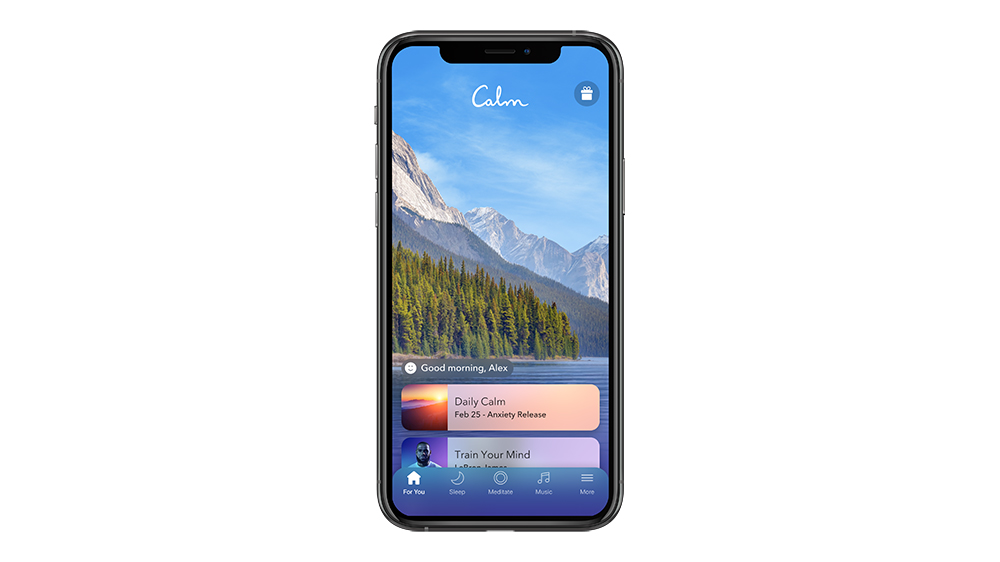
3. Calm
When you first open the Calm app it tells you to take a deep breath and that’s what the whole experience with the app feels like. A breath of fresh air and a chance to switch off and slow down, just for a few minutes.
One of our favorite things about Calm is you’re asked what your focus is before you begin. Whether that’s developing gratitude, increasing happiness or, our favorite, reducing stress.
Calm has a wide selection of different meditations to choose from. There’s a series about confidence, one about saying yes to life, and even a Sigur Ros sound bath experience for when you don’t want guidance but just want some soothing sounds to chill out to.
There’s also a Sleep Stories section of the app all about helping you to sleep soundly. With bedtime stories read by soothing voices or famous soothing voices, including Matthew McConaughey. He tells a story about the universe called Wonder and it’s a very, very dreamy experience.
If you don’t fancy following a guided meditation, Calm also has a timer and a huge catalog of calming music, sounds and ambient noises to choose from, many are geared up for sleep but others are just lovely to listen to while you’re working or doing chores.
We think there are better apps for teaching you the basics of meditation, but Calm has the widest range of meditations, sounds, sleep features and stories to choose from. For us, it really delivers on its name – it’s a destination for calm.
Pricing: You can sign up for a 7-day free trial of Calm. It’s then £42.99/$42.99 for a year.
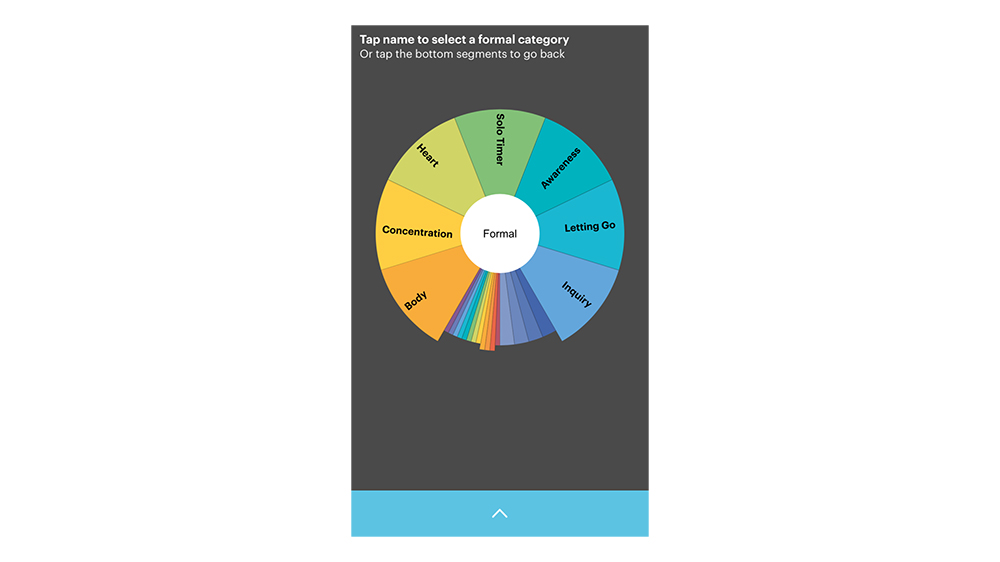
4. Buddhify
Even though we’re creatures of habit, many of us don’t always want to meditate in the same way each and every day. That’s where Buddhify comes in.
Sometimes you might want something slow and soothing to guide you through a difficult experience, other times you need a simple body scan when you’re waiting at the doctor’s office or in line at the post office.
That’s why instead of asking you what you want to focus on (because oftentimes we don’t know, especially if we’re stressed-out) Buddhify will show you a number of scenarios on a colorful wheel and your job is just to choose which situation best describes what you’re going through right now.
The app serves up a recommendation focused on what you might need in the moment – and it always tends to perfectly match your situation with a meditation. Whether that’s going to sleep, walking or travelling.
Our recommendation would be to kick off your meditation journey with Headspace or Waking Up and then supplement your practice with Buddhify, as it makes meditation less of a sacred practice that requires a quiet room, a comfy cushion and incense and more of a practical and helpful tool.
Pricing: £4.99 / $4.99
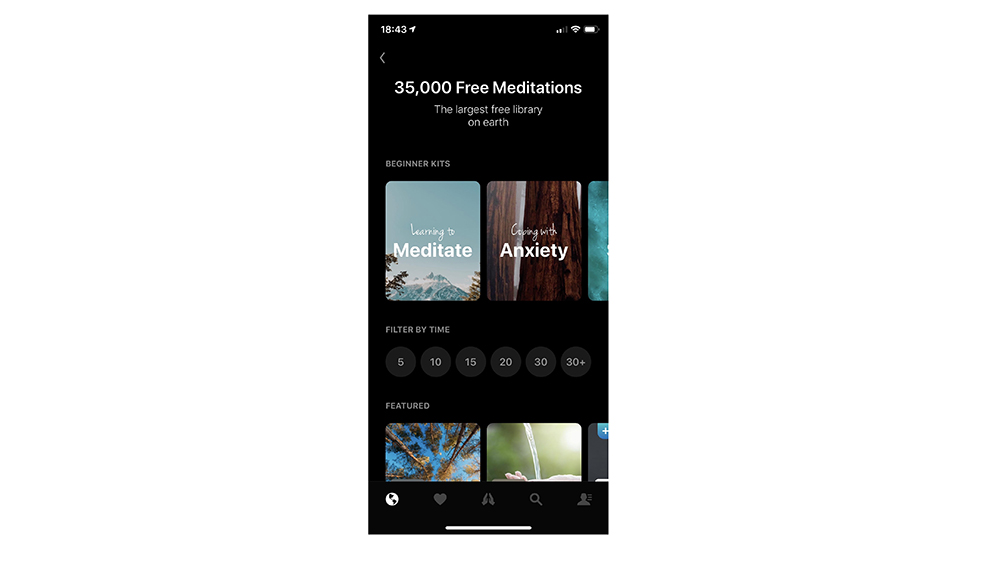
5. Insight Timer
Like Calm, Insight Timer is an app with many guided meditation practices, lessons and features to choose from. That means it’s not just an app for meditating, but a one-stop-shop for feeling good, calming down and reading up about the wider thinking and history behind meditation practice and self-development too.
There are a range of guided meditations on offer in Insight Timer. You can choose from a beginner kit, which includes learning to meditate or coping with anxiety. Or select how you’d like to meditate based on a particular focus, like sleep, stress and anxiety. Or you can pick the type of practice you’re in the mood for, like paying attention to sound, movement or sitting back and taking part in a guided visualization.
There’s a useful 7-day course we’d recommend if you’re new to meditation, which teaches you the basics. But like Calm, we think Insight Timer is a great option once you’ve started to meditate and then want access to a huge range of practices at your fingertips – it’s a pick n’ mix of meditation.
Pricing: Free. But with in-app purchases to unlock more content.
Get daily insight, inspiration and deals in your inbox
Sign up for breaking news, reviews, opinion, top tech deals, and more.
Becca is a contributor to TechRadar, a freelance journalist and author. She’s been writing about consumer tech and popular science for more than ten years, covering all kinds of topics, including why robots have eyes and whether we’ll experience the overview effect one day. She’s particularly interested in VR/AR, wearables, digital health, space tech and chatting to experts and academics about the future. She’s contributed to TechRadar, T3, Wired, New Scientist, The Guardian, Inverse and many more. Her first book, Screen Time, came out in January 2021 with Bonnier Books. She loves science-fiction, brutalist architecture, and spending too much time floating through space in virtual reality.
- Daryl BaxterSoftware & Downloads Writer
